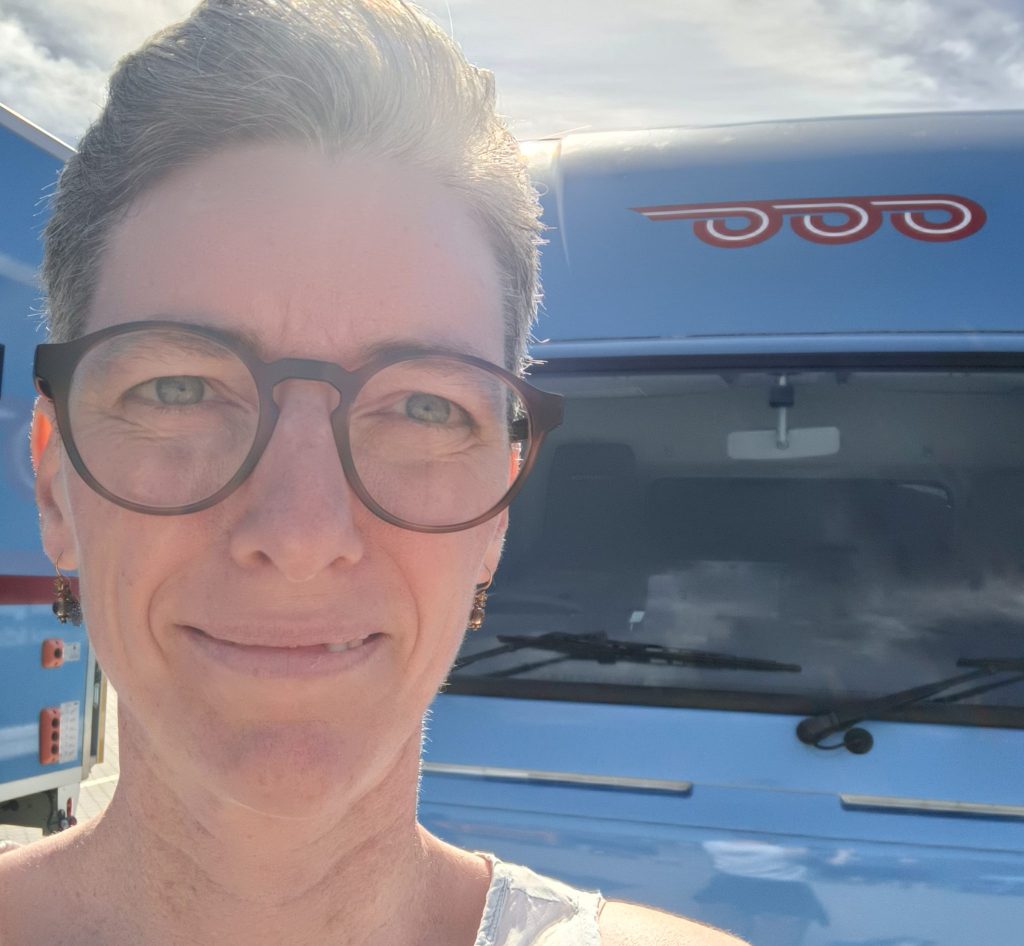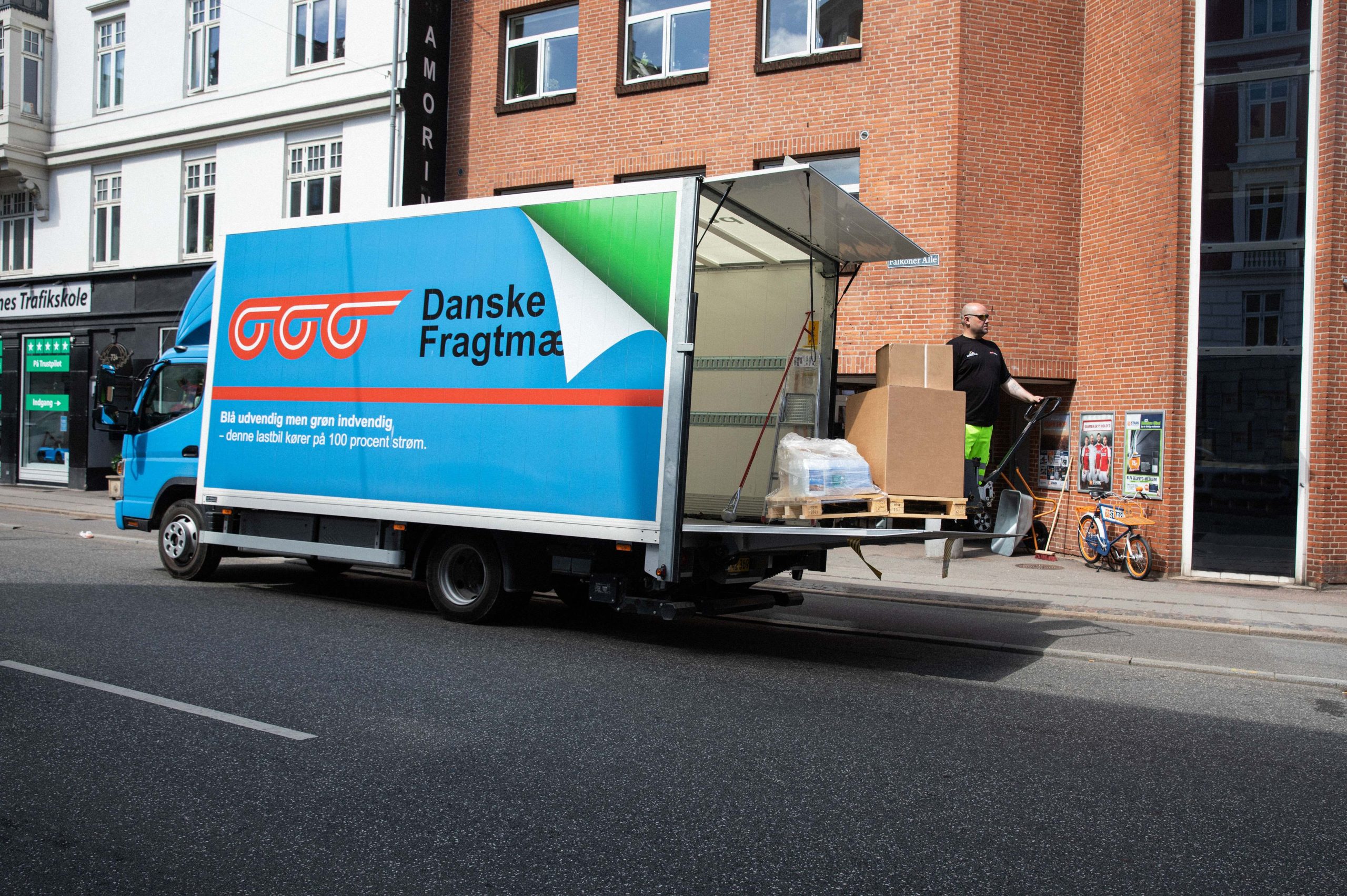Three years ago, the transport and logistics company Danske Fragtmænd had one sustainability consultant. Now, there are three full-time employees in the sustainability department, and electric lorries are replacing diesel vehicles for transporting goods across Denmark.
Read this article in Danish on Arbeidsliv i Norden
“We have started a green transition that has really gathered speed in recent years, and the green academy has been a valuable help on that journey,” says Heidi Mølgaard, sustainability consultant at the company.
More sustainable freight
Danske Fragtmænd has a total fleet of 1,800 lorries that transport general cargo – goods that are not suitable for pallet transport because of their size.
Many of the company’s deliveries take place at night and across the country, and for this type of nationwide transport, the company has chosen to introduce electric lorries.
“It’s a major shift for us, which we are making for environmental reasons and because our customers want their goods transported in electric lorries. At the same time, it allows us to operate longer trucks than before,” says Heidi Mølgaard.
The longer vehicles can carry more goods, meaning fewer journeys – also an environmental benefit, she explains.
Danske Fragtmænd now also provides automatic, ongoing information to customers about emissions from the transport services they purchase, and its sustainability team trains colleagues in sustainability.
“Sustainability has become an important agenda, and I spend a good part of my time pushing it internally across departments,” says Heidi Mølgaard.
At the moment, she is training “waste ambassadors” among employees, and for that, she draws on her extensive experience in teaching from her time as an upper-secondary school teacher, she explains.
A meaningful career change
She acquired the qualifications to work with green transition through Det Grønne Akademi, a programme run by Aarhus Municipality that upskills highly educated unemployed people to work in sustainability, and matches them with companies seeking help in their green transition.
“I was an unemployed upper-secondary school teacher when the job centre offered me a place on the green academy. I had always been interested in the environment and sustainability without knowing very much, and I had no experience in the business sector.
“But it was an exciting mix of theory and practice, and it made me want to work with the green transition.”

After five weeks of sustainability training, Heidi Mølgaard took part in two internships as a so-called “change agent”, helping companies to prepare climate accounts.
The second internship led to a temporary job, and she later applied for and secured her current permanent position at Danske Fragtmænd, where she has now worked for three years.
“For me personally, the green academy has been a path to a career change and to working with the green transition. And for Danske Fragtmænd, it was a way to get support in producing sustainability data (so-called ESG reporting),” says Heidi Mølgaard.
Danske Fragtmænd also operates a warehouse hotel storing general cargo for customers. The company chose to get help from three change agents from the green academy to prepare a climate account for its warehouse operations.
A municipal priority
Work on sustainability is still a relatively new field in many companies, and major regulatory changes are taking place.
Heidi Mølgaard therefore spends a good deal of time staying updated. In that light, five weeks of training may seem short, but that is not the case, she says.
“I already had a long higher education, and the course equipped me well academically and led straight into a concrete assignment. And the whole sustainability field is developing so rapidly that I have to keep up-to-date anyway.”
For Aarhus Municipality, the green academy is an important part of both employment and climate policy, explains project manager Ulla Aude.
Det Grønne Akademi
A nine-week programme in Aarhus Municipality for unemployed people with at least four years of higher education. It includes five weeks of sustainability training, followed by a four-week internship in a company.
During the internship, participants produce a sustainability report for the company, outlining the path towards more sustainable production and operations. The report should map smaller and larger measures and present a practical implementation plan.
Aarhus Municipality aims to be CO₂-neutral by 2030.
Since 2020, the green academy has completed 11 programme rounds. 91 companies and 18 municipal workplaces have received help from change agents to kick-start their green transition. A total of 330 change agents have been trained.
“It makes perfect sense to break down the silos between employment and climate measures in a municipality in the way we do through the green academy.”
It is a win-win-win, she says:
“Companies are very happy to get extra resources in the form of highly educated unemployed people to help with sustainability. We get a greener workforce. And at the same time, it strengthens climate efforts both in the municipality and in the companies.”
CO₂-neutral municipality
Aarhus Municipality aims to be CO₂-neutral by 2030 and offers various services to companies seeking support for their green transition.
Ulla Aude believes that companies receiving assistance through the green academy become better equipped to work with sustainable development.
“Their knowledge has increased. They now have a better overview and a practical action plan for their next steps,” she says.
The change agents also help companies access green business-support schemes and funding, so the green development continues after the programme ends.
“The green academy is a good model. Working with sustainability is a major task for a company, and in this way, more businesses get started.”
Matching unemployed participants with companies requires considerable municipal resources, but the results speak for themselves, says Ulla Aude.
In the past five programme rounds, 150 unemployed people have taken part. 94 are now in work, and five are in education.





